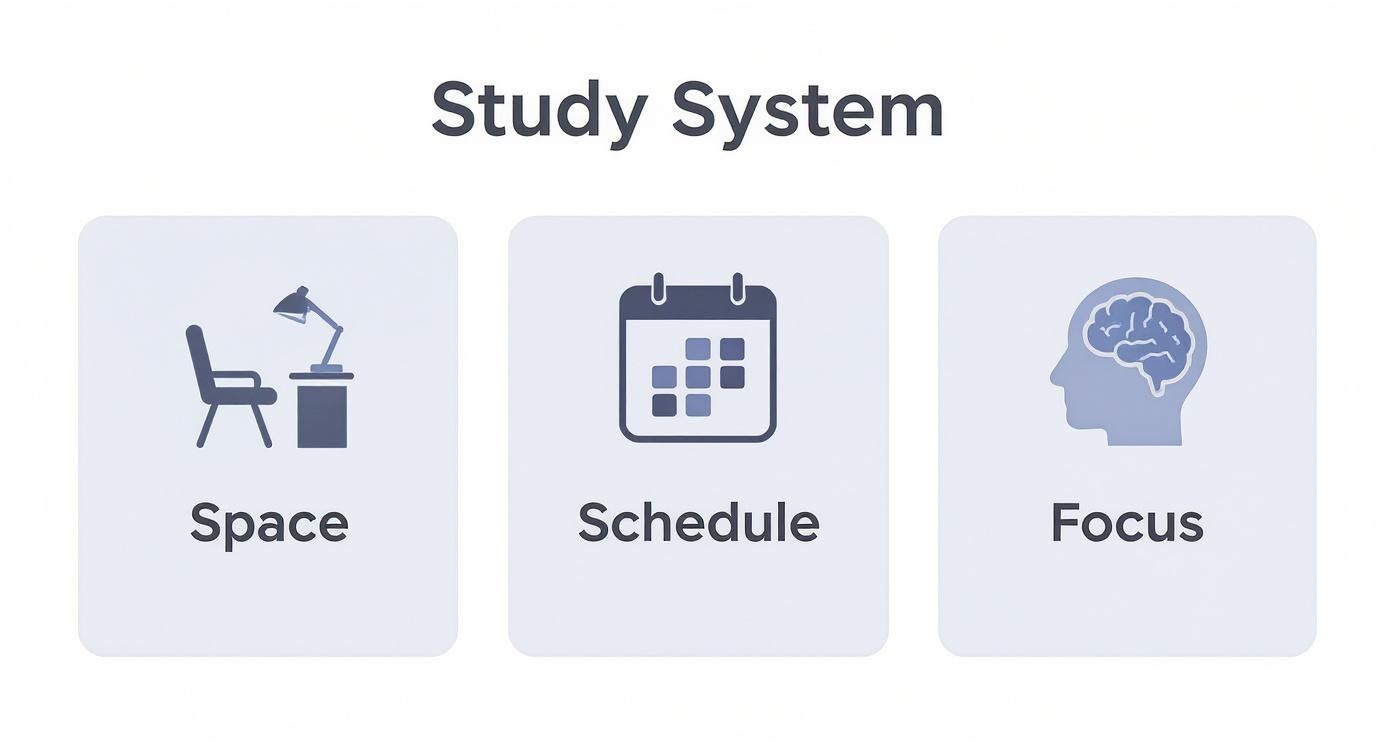
Staring at your course materials and feeling completely drained? It happens to everyone. Figuring out how to motivate yourself to study isn't about waiting for a magical bolt of inspiration. It’s about building a solid system that keeps you going, even on the days you'd rather be doing anything else.
For online learners, self-discipline is everything. Without a teacher checking in or a fixed class schedule, the drive to succeed has to come from you. The secret is connecting your daily study efforts with the big, valuable goal you set for yourself when you first enrolled.
Why Your Mindset is Your Biggest Motivator

Let’s get one thing straight: motivation is a muscle. You have to build it and work it, not just wait for it to show up. For busy adult learners trying to fit studying around work, family, and life, it's easy to feel overwhelmed. If you're struggling to find the energy to even open a textbook, you are definitely not alone.
Many of us try to force it, thinking, "I have to study." This approach turns learning into a chore and leads straight to burnout. The real trick is to flip your perspective to, "I get to study." This simple change reframes your education as an opportunity for growth—a genuine step towards the future you want—not just another box to tick on your to-do list.
Connecting Study to Your Goals
When you look into what students want to achieve with online learning, there's a clear pattern: they're all seeking a transformation. Whether it's a new career, a promotion, or the simple satisfaction of mastering a skill, that end goal is what truly counts. Your daily study sessions are the small, essential steps that get you there.
Motivation problems usually appear when we lose sight of that bigger picture. Our brains are wired to resist things that feel difficult or too far off in the future. Procrastination isn't a character flaw; it's a sign of a disconnect between what you're doing now and the reward you'll get later. To build a drive that lasts, you need to make that connection crystal clear.
The key to motivating yourself is to figure out what's really going wrong. Is the goal not valuable enough? Do you secretly doubt you can achieve it? Once you diagnose the issue, you can take practical steps to fix it.
Creating a System for Success
Forget relying on willpower; it's notoriously unreliable. The most successful online students build a system. It doesn’t need to be rigid, but it must provide enough structure to make starting easier. This is especially true when you're an online learner and you're the one in the driver's seat.
Here are a few ideas to get you started:
-
Define Your ‘Why’: Get really specific about why you started this course. Is it to earn a higher salary? To finally switch careers and work in a field you love? Write it down and stick it somewhere you'll see it every day.
-
Start Tiny: Feeling overwhelmed by a huge module? Don't think about the whole thing. Just commit to 15 minutes. Seriously. Taking action is what creates motivation, not the other way around.
-
Create a Cue: Pick a specific time and place for studying. Maybe it's the kitchen table with a cup of tea right after dinner. This trains your brain to switch into focus mode automatically.
By building a supportive structure, you turn your educational journey into something you choose to do. This proactive approach is exactly what flexible online learning is all about. With a provider like Stonebridge, you can build a study routine that actually fits your life, empowering you to hit your goals without pressure.
Pinpoint Your 'Why' to Fuel Your Drive

Let's be honest, motivation can disappear in a flash when your goal feels abstract or miles away. It’s easy to say, "I want this qualification," but that statement alone won't get you through a tough study session after a long day. To truly figure out how to motivate yourself to study, you must forge a strong link between your daily grind and your real-life ambitions.
That link is your 'why'. It's the powerful, personal reason that convinces you to open the laptop when the sofa is calling your name. Think of it as the ultimate fuel for your self-discipline, especially when you’re studying online and have to be your own cheerleader.
Look Beyond the Qualification
For a moment, forget about the piece of paper you’ll get at the end. Instead, think about the real change you're trying to make in your life. What will completing this course actually make possible for you?
-
A career change you desperately need? Are you studying a course in health and social care to finally escape a job that drains you and find a role where you can truly make a difference?
-
A promotion or a much-needed pay rise? Is that business management diploma the key to securing a senior position and giving your family more financial security?
-
Personal fulfilment? Are you finally chasing a dream you put on hold, like working with animals through a veterinary support course, just for your own sense of achievement?
Answering these questions honestly gives your study sessions a deep sense of purpose that a simple certificate never could. This is all about picturing what that success will actually look and feel like for you.
Your 'why' is like an internal compass. When you feel a bit lost or inspiration dips, it points you back in the right direction and reminds you why the journey is absolutely worth it. It gives the hard work meaning.
Articulate Your Driving Force
Once you’ve got a clear picture, get it down on paper. Don’t be vague. Instead of writing "a better job," be specific: "To become a Teaching Assistant at my kids' school so I have a more flexible schedule." A tangible goal like that is infinitely more motivating.
If you’re finding it tricky to nail down what truly drives you, a tool like a purpose of life quiz can sometimes help you put your feelings into words. Understanding what makes you tick makes it so much easier to stay committed when you hit a bump in the road.
At Stonebridge, we see learners transform their lives every day. They aren't just earning qualifications; they're building new confidence and taking control of their futures. Our flexible, subscription-based courses are built to support those big ambitions. The ability to study at your own pace means you can fit learning around your life, making it easier to stay connected to your 'why' without feeling crushed by rigid deadlines or huge upfront costs.
Design a Study System That Actually Works
Relying on sheer willpower to study is like hoping for sunshine every day—it’s just not reliable. A solid system, though? That’ll carry you through even on the greyest of days. When you’re trying to figure out how to motivate yourself to study, building a routine you can stick to is far more effective than waiting for inspiration to strike.
This is especially true for online learners who have to manage their own time. A good study system is the difference between making steady progress and feeling constantly behind.
Create a Dedicated Study Space
Your brain loves cues. When you carve out a space that’s only for studying, you’re sending it a powerful signal that it’s time to get down to business. It doesn't have to be a whole room; a specific corner of the kitchen table or a particular chair will do the job perfectly.
The key is to keep this area tidy and stocked with everything you need—notebooks, pens, your laptop. You want to eliminate any little barrier that could give you an excuse to procrastinate. The less you have to think about getting set up, the easier it is to just sit down and start.
Master Your Time with Proven Techniques
For online learners, a flexible system is everything because your schedule can change from one week to the next. Instead of a rigid, unforgiving timetable, give these adaptable methods a go to structure your study sessions and keep your focus sharp.
-
Time Blocking: Look at your week ahead and block out specific, non-negotiable slots for studying. Even three 45-minute blocks a week is a fantastic start. This turns a vague idea ("I'll study this week") into a solid plan.
-
The Pomodoro Technique: This is brilliant for tasks that feel overwhelming. You work in a focused 25-minute sprint, then take a 5-minute breather. After four of these "Pomodoros," you take a longer break. It makes that initial push to get started feel much less daunting.
-
Task Batching: Group similar jobs together. For instance, dedicate one session purely to reading course materials and another just to working on assignments. This helps your brain stay in one mode, making you much more efficient.
A huge part of any effective system is simply knowing how to stay locked in. Exploring practical strategies on how to focus while studying can make a massive difference to what you get out of your scheduled time.
Build a Routine That Bends, Not Breaks
Here’s the most important bit: any study system has to serve you, not the other way around. Life happens. You might have a brutal week at work or a family commitment that has to take priority. A good system allows for that flexibility without making you feel like a failure.
If you miss a scheduled session, don't let it throw you off course. Just reschedule it. The goal is consistency over perfection. This mindset is crucial for sticking with an online course long-term. At Stonebridge, our subscription-based learning is built on this very idea. You can pause your studies when life gets in the way, ensuring your education fits your reality. Learning to build these habits is one of the 4 study skills every learner needs to truly succeed.
Beat Procrastination with Smart Mind Tricks
Procrastination is motivation's arch-nemesis. It's that all-too-familiar pull towards anything other than your course materials. But here’s the thing: procrastination isn't usually about being lazy. It’s a defence mechanism your brain uses to avoid tasks that feel overwhelming, complicated, or boring.
The secret to learning how to motivate yourself to study is a bit counterintuitive. Motivation doesn't just magically appear; you create it through action. Instead of waiting for inspiration, you need a few clever tricks up your sleeve to get the ball rolling.
Make Starting Effortless
One of the best ways to snap out of a procrastination loop is the 'Two-Minute Rule'. It’s brilliantly simple: whatever task you're putting off, just commit to doing it for two minutes. That's it. Got a heavy chapter to read? Just read the first page. Staring at a blank document for an assignment? Just open it and type the title.
This tiny commitment dissolves the mental barrier that makes the task seem so daunting. You’ll be surprised how often those two minutes turn into ten, then thirty, because you've already built momentum.
Another great technique is 'temptation bundling', where you pair something you want to do with a study task you need to do.
-
Save your favourite podcast specifically for when you're organising study notes.
-
Make that really nice cup of coffee, but only allow yourself to drink it while reading your course materials.
-
Reward yourself with an episode of a show you're binge-watching, but only after a solid 45-minute study block.
By linking an enjoyable activity to your studies, you start to build a positive association. Studying gradually feels less like a chore and more like part of a rewarding routine.
The infographic below gives a great overview of the essential parts of a study system built to keep procrastination at bay.

As you can see, it all comes down to creating the right environment, sticking to a schedule, and learning how to protect your focus.
Motivation Quick Fixes vs Sustainable Strategies
It's easy to fall for quick fixes when your motivation is low, but these often lead to burnout. Building real, lasting discipline comes from implementing sustainable strategies that work with your brain, not against it.
| Quick Fix Tactic (Leads to Burnout) | Sustainable Strategy (Builds Discipline) |
|---|---|
| Pulling an all-nighter before a deadline. | Spacing out study sessions over several days (distributed practice). |
| Relying on caffeine and sugar for energy. | Prioritising sleep, nutrition, and short breaks to maintain energy levels. |
| Waiting for a "burst of inspiration" to start. | Using the 'Two-Minute Rule' to start small and build momentum. |
| Setting a vague goal like "study more". | Breaking down large goals into small, specific, and achievable tasks. |
The key takeaway here is that consistency beats intensity every time. Small, smart habits will always outperform short-lived bursts of frantic effort.
Celebrate Every Small Victory
Your brain is wired to respond to positive reinforcement. When you tick off a study session or finish a small section of a module, consciously acknowledge it. This isn't about throwing a party; it's about giving yourself a mental pat on the back for showing up.
Each small win releases a little bit of dopamine, the brain's "feel-good" chemical. This creates a positive feedback loop that reinforces the habit, making you more likely to stick with it next time.
This approach is especially effective for distance learners. With a flexible Stonebridge course, your learning is already broken down into manageable modules. Completing each one is a concrete achievement you can celebrate. These small wins stack up, building your confidence and motivation as you work your way towards that final qualification.
How Flexible Learning Can Be Your Greatest Ally
A rigid study plan is often the first thing to buckle when life gets complicated. For any adult learner, figuring out how to motivate yourself to study is less about brute force and a strict schedule, and more about finding a system that bends without breaking. This is where a flexible approach becomes your secret weapon for staying on track.
When you're juggling work, family, and everything else, your motivation will have its ups and downs. That’s a completely normal part of any long-term project. Having a study plan that can absorb these natural dips is essential for your success.
Embrace Adaptability
Instead of seeing a missed study session as a failure, a flexible model lets you see it for what it is: a simple reschedule. This mindset shift is crucial.
-
Life Gets in the Way: Had a tough week at work? A flexible course lets you ease off without the fear of falling permanently behind.
-
Energy Management: Feeling energised? You can power through a few modules and get ahead. Feeling completely drained? You can take a guilt-free break.
This adaptability strips away the pressure and guilt that so often derail students on more structured programmes. Understanding the real benefits of distance learning is key to using this flexibility to your advantage.
The goal isn’t perfection; it’s persistence. A flexible learning structure supports that persistence by acknowledging that your progress won't always be a straight line.
Stonebridge Associated Colleges offers flexible, subscription-based courses across a wide range of subjects. With over twenty years of experience, we deliver an array of career-focused programmes in areas like health and social care, business, and education. Learners benefit from 100% online study, personalised tutor support, and the freedom to pause or cancel their subscription at any time without long-term credit agreements.
Our affordable monthly fee and modular structure allow you to tailor your learning around work and life commitments. This freedom ensures that a temporary dip in motivation doesn't mean giving up on your career goals. It provides the breathing room you need to manage everything else, making your educational ambitions genuinely achievable.
Frequently Asked Questions About Study Motivation
Even with a solid plan, you're bound to hit a few stumbling blocks. Knowing how to motivate yourself to study often comes down to having a few go-to solutions for when things get tough. Let's tackle some of the most common questions from online learners.
How Do I Stay Motivated When I’m Tired After Work?
This is the big one, isn't it? After a full day, your energy is at rock bottom, and the idea of studying can feel impossible. The trick here isn't forcing a long session; it's about being clever with the little energy you have.
Think in terms of micro-study sessions. Can you manage just 15 or 20 minutes? That's enough to review notes or watch a quick course video. These small wins keep momentum going without feeling overwhelming. Another great tactic is to piggyback your study time onto an existing habit, like studying for 25 minutes right after dinner. It creates a simple routine that your brain can latch onto without needing a huge burst of willpower.
What Should I Do If I Fall Behind On My Study Schedule?
That sinking feeling when you realise you're behind is the worst. It can trigger a nasty cycle of guilt and avoidance. The most important thing to do is ditch the "all-or-nothing" mentality. Missing a study session doesn't mean the whole plan is a write-off.
First, take a breath. Don't try to cram everything you've missed into one giant session—that’s a fast track to burnout. Instead, look for small pockets of time over the next week to cover the most important topics you missed.
Your goal is recovery, not perfection. Acknowledge the slip, adjust your plan, and keep moving. Beating yourself up is a massive motivation killer and gets you nowhere.
If you find you're constantly falling behind, it might mean your original schedule was too ambitious. The beauty of flexible learning is that you can revise your plan to fit your reality.
How Can I Make Studying Less Boring?
Let's be real—not every topic will be thrilling. When you hit a module that feels dry, it’s easy for your motivation to nosedive. The key is to make the material more engaging for you. Stop just passively reading and turn it into an active process.
-
Teach it to someone: Try to explain a concept you've just learned to a friend or partner. The act of teaching forces you to understand it on a much deeper level.
-
Connect it to your life: How does this theory apply to your job? Finding that real-world connection makes abstract ideas feel more solid and interesting.
-
Mix up your media: If you're tired of textbooks, look for documentaries, podcasts, or YouTube videos that cover the same subject. A different format can spark your interest again.
Ultimately, the best way to keep your motivation high is to learn in a way that actually supports your life. A rigid course can make these common hurdles feel impossible to overcome. A flexible, subscription-based model gives you the power to pause when life gets in the way, adjust your pace, and truly own your learning journey.
At Stonebridge Associated Colleges, we've built our courses around the realities of adult life. Our subscription model offers you the freedom to learn without the pressure, helping you build motivation that lasts. Ready to start learning on your terms? Explore our wide range of online courses today.




